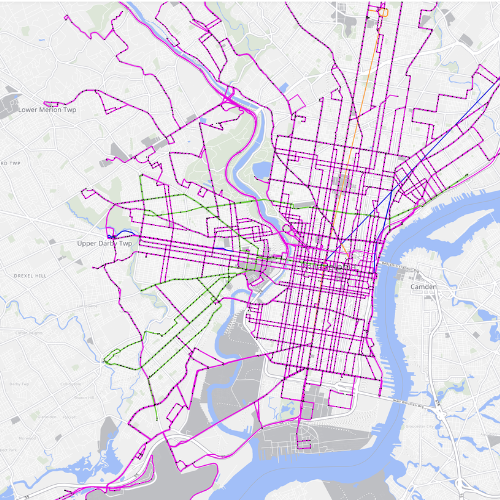High-accuracy and high-fidelity geospatial data is essential for understanding our physical environment and enhancing situational awareness. It’s also crucial for developing innovative technologies and future mapping solutions. Recognizing this, PTV Group joined the Overture Maps Foundation in May 2023 to support their mission of establishing a new standard for open map data. We spoke with Overture’s Executive Director Marc Prioleau about their milestones, the benefits of an open data standard, and the power of community collaboration.
Overture was founded around 1,5 years ago. What were the most significant milestones since then?
Marc Prioleau: December 2022 – when AWS, Meta, Microsoft, and TomTom came together to establish the Overture Maps Foundation – marked the beginning of our journey to create open, reliable, and interoperable map data accessible to all map service providers and developers. Since then, Overture has achieved several significant milestones.
Throughout 2023, we focused on laying the groundwork for our mission. We launched five data themes for core map elements, each adhering to a consistent data schema. This schema lets developers know how the data is structured so that it can be consistently used in their applications. We also established a monthly release cadence for delivering updated map data.

We also developed a stable reference system, tied to the features in the map layers. We call it the global entity reference system (GERS). This is extremely powerful as it lets other spatial data related to those features be easily and unambiguously conflated to the underlying map. As maps contain more and more data, conflation, or combining data from different sources, has become a significant problem for developers.
The Overture membership has grown in response to our progress. With nearly thirty member organizations, we have built strong working relationships and teamwork across a diverse coalition of companies and institutions from the biggest in the world to organizations with ten employees. I am very excited about the collaboration we are building where we can combine insights, resources and technologies from a wide range of companies.
Starting in mid-2024, we entered a new phase focused on growth. Having built the foundation in the previous year, we aimed to expand our impact in the market. Adoption of Overture’s open map data is the clearest signal that we are on track. That is a priority. We also want to improve the data quality and coverage and build channels to get feedback from the community to drive continuous improvement.
In April 2024, we released our first Beta version. This marked the next step in our progress, with base layers of data established for six themes, the implementation of a consistent schema and of GERS.
There is a lot more to do but we have made great progress and are confident in our plan. We remain committed to our mission of democratizing access to high-quality map data and advancing mapping technologies.
What benefits will an interoperable open map data standard bring? How will it change the (mapping) industry?
Interoperable open map data promises a fundamental shift in the mapping industry, offering a backbone for organizing spatial data globally. Overture sees two critical components at the core of this transformation.
Firstly, the establishment of open, highly accurate base layers is paramount. These layers, focused on specific data themes like transportation, buildings, or places of interest, prioritize accuracy and completeness over richness. Open licenses make these base layers universally accessible, minimizing usage restrictions. Moving ahead, we will focus on building the coverage and accuracy of these base layers through collaborations with National Mapping Agencies (NMAs) and other data custodians. The goal is to consolidate high-accuracy spatial data into a shared, centralized set of base layers.
Secondly, the open reference system which we call the Global Entity Reference Service (GERS), simplifies the integration of all kinds of spatial data onto the base layers. GERS is global, open, and tied to specific map features, making it a uniquely suitable reference system for wide use. This combination of open base layers and an open reference system can build an ecosystem where diverse spatial data sources, regardless of licensing, can be harmonized and utilized to develop rich applications and analytical insights.
The potential of open map data is immense, but achieving this vision has complex challenges. Overture’s goal is to collaborate in building the open base layers, and enable organizations to focus their efforts on delivering unique value-added services on top of the shared data to their customers.
Overture now has 28 members from different industries. Why is open map data an important topic beyond the pure mapping industry?
The breadth and diversity of our membership demonstrates how spatial data is a core horizontal asset that cuts across so many sectors. Map data is used in consumer applications, for logistics and enterprise applications, for analysis of environmental issues, and understanding of geopolitical trends. It is becoming a fundamental data set for us in AI platforms which need to tie understanding to places. Given that importance, it is all the more valuable to make the core data sets that underlie all these applications open and shared by all. That allows everyone to benefit from them and also to consolidate feedback so that the map data can reflect the world as it changes.
By advocating transparency, collaboration, and accessibility in map data sharing we aim to foster a community-driven approach to spatial data management. Our diverse membership base reflects the broad utility and significance of open map data beyond traditional mapping realms. As we move forward, I see this collaboration becoming even broader.

How does the cooperation between the members look like? And why is this community so important?
Collaboration is built into any open source project. The assumption is that, through collaboration, we can build a shared asset that is higher quality and offers a lower cost of ownership than any company can do on its own. Open data projects have some unique aspects that are different from open code projects.
Overture relies on our members for not only engineering but also for access to advanced technology and to data that can go into the map. We have benefitted from the engineering talent brought by our members already, as we have been able to combine many viewpoints to develop a schema, reference system and architecture that will be robust and usable by many sectors.
As we move into production, we will benefit from the combined catalog of technologies that are owned by various members. Machine learning, computer vision and AI are all important technologies for building map data. If I look across our members, we have a lot of skills in all those areas. We hope to leverage those to build the best open map.

What do you think is the most important expertise PTV is bringing in?
The expertise that PTV Group brings to Overture Maps Foundation, particularly in the realm of multimodal modeling and simulation software for mobility is valuable. PTV’s decision to join the foundation in May 2023 underscores the critical role of high-accuracy geospatial data in our increasingly digital and automated world, particularly within the mobility sector. Their proficiency in multimodal modeling, simulation, and map development significantly enriches our collaborative efforts towards establishing a new standard for open map data.
By joining Overture, PTV Group can contribute its extensive 40-year experience in multimodal and multiresolution network modeling and simulation for transportation planning and engineering. This expertise will be pivotal in refining the data modeling of map data and developing innovative technologies crucial for effective transportation network management.
Moreover, PTV’s participation in the Schema Working Group shows their interest in shaping the development of a robust and comprehensive data schema for real-world map data. By leveraging their insights and experience along with those from other members, Overture can ensure that the data schema aligns with industry standards and best practices, facilitating the creation of a comprehensive, accurate, and extensible map dataset.
PTV Group’s membership in Overture adds to our collaborative efforts, highlighting our shared commitment to advancing the field of open map data while remaining grounded in the practical aspects of our work.
Related Products



